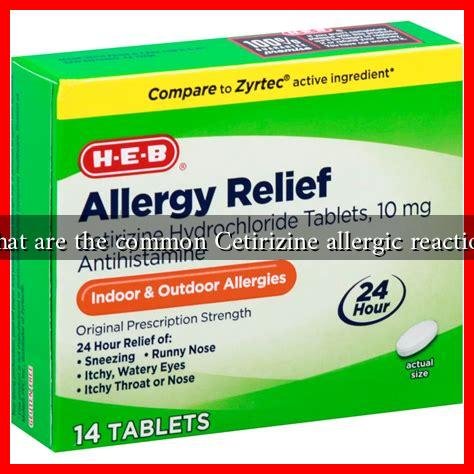-
Table of Contents
What are the Common Cetirizine Allergic Reactions?
Cetirizine is a widely used antihistamine that helps alleviate symptoms associated with allergies, such as hay fever, hives, and other allergic conditions. While it is generally considered safe and effective, some individuals may experience allergic reactions to this medication. Understanding these reactions is crucial for anyone considering or currently using cetirizine. This article explores the common allergic reactions associated with cetirizine, their symptoms, and what to do if they occur.
Understanding Cetirizine
Cetirizine, marketed under brand names like Zyrtec, is a second-generation antihistamine that works by blocking the action of histamine, a substance in the body that causes allergic symptoms. It is commonly prescribed for:
- Seasonal allergic rhinitis (hay fever)
- Perennial allergic rhinitis
- Chronic urticaria (hives)
Despite its effectiveness, cetirizine can cause allergic reactions in some individuals, which can range from mild to severe.
Common Allergic Reactions to Cetirizine
Allergic reactions to cetirizine can manifest in various ways. Here are some of the most common reactions:
- Skin Reactions: These may include rashes, itching, or hives. Skin reactions are among the most frequently reported side effects.
- Respiratory Issues: Some individuals may experience difficulty breathing, wheezing, or a tight feeling in the chest.
- Gastrointestinal Symptoms: Nausea, vomiting, or diarrhea can occur in some cases.
- Swelling: Angioedema, or swelling of the deeper layers of the skin, particularly around the eyes and lips, can be a serious reaction.
- Anaphylaxis: Although rare, cetirizine can trigger a severe allergic reaction known as anaphylaxis, which requires immediate medical attention.
Case Studies and Statistics
While allergic reactions to cetirizine are not common, they do occur. A study published in the Journal of Allergy and Clinical Immunology found that approximately 1-3% of patients using cetirizine reported experiencing adverse reactions. In a case study involving a 30-year-old woman, she developed hives and swelling of the lips after taking cetirizine for seasonal allergies. This case highlights the importance of monitoring for symptoms after starting any new medication.
What to Do If You Experience an Allergic Reaction
If you suspect that you are experiencing an allergic reaction to cetirizine, it is essential to take the following steps:
- Discontinue Use: Stop taking cetirizine immediately if you notice any signs of an allergic reaction.
- Seek Medical Attention: For mild reactions, consult your healthcare provider. For severe reactions, such as difficulty breathing or swelling of the face, seek emergency medical help.
- Document Symptoms: Keep a record of your symptoms and any medications taken, as this information can be helpful for healthcare providers.
Conclusion
Cetirizine is an effective antihistamine for managing allergy symptoms, but it is not without risks. Understanding the common allergic reactions associated with cetirizine can help users make informed decisions about their health. While most individuals tolerate cetirizine well, those who experience allergic reactions should take immediate action to ensure their safety. Always consult with a healthcare professional before starting or stopping any medication, and report any adverse reactions promptly.
In summary, being aware of the potential allergic reactions to cetirizine can empower users to recognize symptoms early and seek appropriate care. If you have concerns about cetirizine or any other medication, consider discussing them with your healthcare provider to ensure the best treatment plan for your needs.

